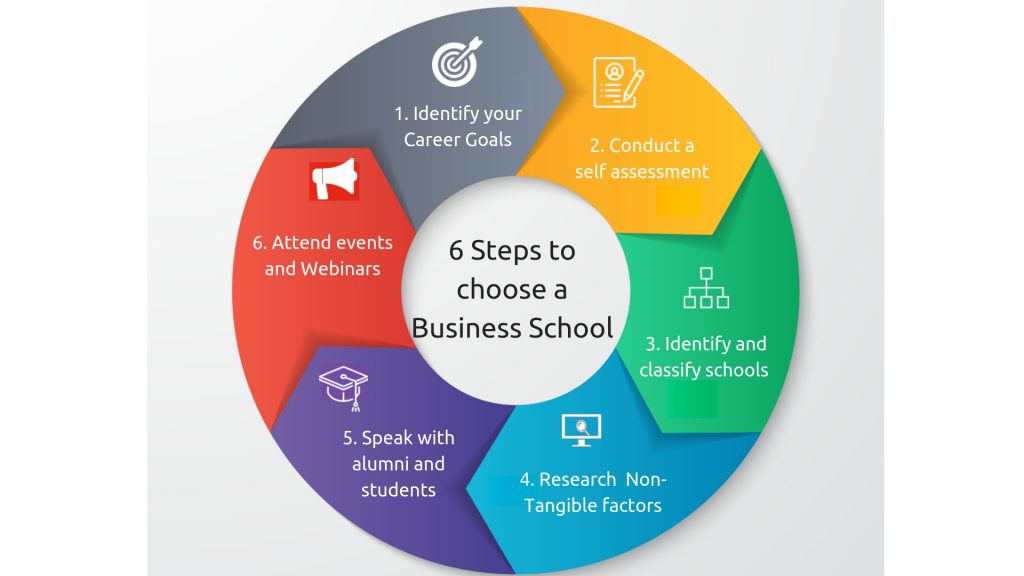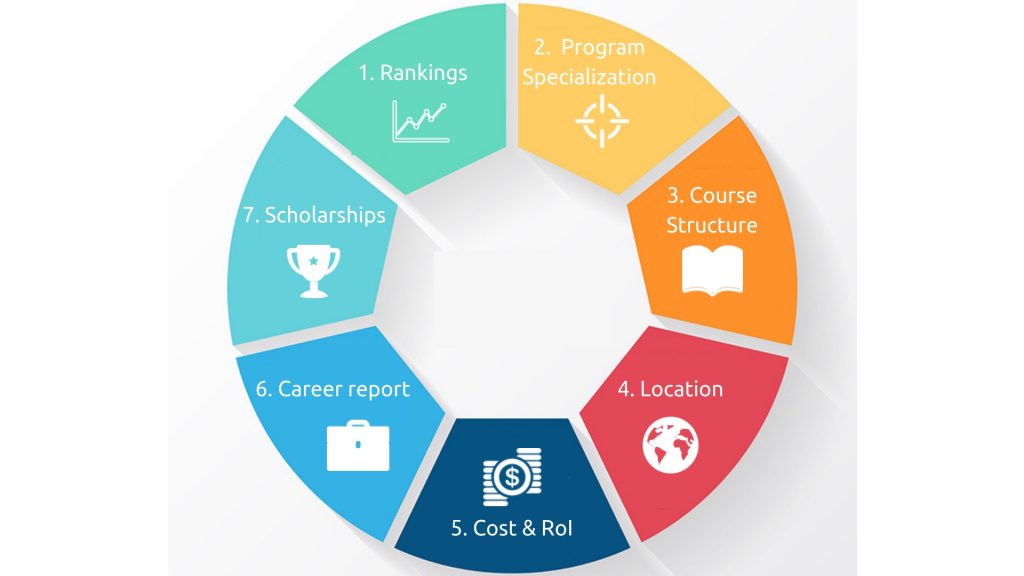Business school offers a life-changing experience that positions you to reimagine and then pursue your highest aspirations, both personal and professional. Selecting the right Business School that will be your ally and partner during this journey is one of the most important and maybe the most difficult decision you must make.
It will determine your professional and personal development for years to come. Thus, to choose a Business School, it is important to identify your personal goals and determine your Business School “fit”.
Watch this video where Farman Singh Garcha (Dartmouth Tuck Candidate) talks about the key considerations before selecting a b-school and the mistakes MBA aspirants make during this process.
Why is it important to select and compare Business Schools?
Before we proceed to the process of selecting and comparing Business Schools, it is imperative that we understand why it is important. Following are the reasons for the same:
- To understand the application requirements
- To identify alignment with your post-MBA career goals
- To identify the aspects of business school that you value
- To understand the cost of pursuing an MBA
- Determine your chances of getting into your target business school

To understand application requirements
Each business school has its own set of admission processes and requirements. Between the different essays and recommendations, it is important to focus on a few applications and to do them well. A well-rounded application that effectively demonstrates your skills and qualities greatly increases your chances of securing an admit. Also, with 2300+ graduate business schools around the world and between European 1-year accelerated programs or the traditional 2-year American MBA, it becomes even more important to choose the right business school and MBA program.
To identify alignment with post-MBA career goals:
Since your Business School serves as a launchpad for your career, it is important to identify how aligned the school is with your post MBA career goals. For example, if your goal is to work at a certain company, it is wise to check if this company recruits from your selected B-schools. If your goal is to transition into another industry such as finance or consulting, check the job placement and statistics report of the B-school.
To identify which aspects of the business school experience you value
This helps in selecting the right business schools according to your personalized criteria and their priority. e.g., if you value starting salaries at graduation or opportunities for leadership development during the course, there are a lot of options that may suit you.
To understand the cost of an MBA
An MBA is an expensive proposition, and thus it is important to understand all the costs associated with getting one. Besides the cost of tuition, there are many other expenses that you may incur, including living costs, etc.
Determine your chances of getting into your target schools and programs
During the whole process of selecting and comparing schools, you will learn a lot about them. From what they look for in candidates to what they provide in terms of the learning environment and support. Thus, with deep introspection and reflection, it will help you determine your chance of success or failure at securing an admit.
How to shortlist business schools?

Now, that we have understood why it is important to select and compare business schools, let us look at the process to shortlist them.
Here is a 6-step process to shortlist your target Business schools:
- Identify your post MBA career goals
- Start with a self-assessment
- Identify schools
- Research Online – Non-Tangible Factors
- Speak with alumni and current students
- Attend admission-related events (online and offline)
Identify your post-MBA career goals
The resolve of getting through Business School is derived from deep introspection and self-awareness. Identifying where you are in your career and where you want to go is the most essential step in determining the list of schools that will help you in getting there.
In this step, you need to identify what is it that you want to accomplish after you are done with your MBA. All the top business schools look for candidates with clear and achievable goals and how do they plan to accomplish these goals by getting an MBA from their school. These post-MBA career goals are the central themes for various application questions and even for interviews. In assessing the thousands of applicants vying for a few hundred spots, admission committees ask questions such as “Why do you want an MBA?” and “Why an MBA at our school?.”
Following are some common reasons given by aspirant to the “Why MBA?” question:
- Switching to a different industry or to transition into a new career
- Looking for better remuneration and salaries
- Looking for a leadership role
- Changing geography and location
Thus, it is important to take a step back and identify your motivations for an MBA. The clarity gained from this step, early on in your application process will serve as a guiding light through the various stages of the marathon – that is the MBA application process.
Conduct a Self-Assessment
Business school admissions is a hyper-competitive field. The best MBA programs look for people who have the track record and credentials to make a big impact in their chosen careers/fields after getting their MBA. Thus, a self-assessment serves both as a reality check and as a guideline to improve your profile, and become worthy of securing an admit to a top Business School.
Things that you need to consider while conducting a self-assessment include, but are not limited to:
- Your undergraduate GPA
- Your GMAT score
- Amount of work experience required
- Academic and professional skills
Your answers to all the above questions will help you determine and classify the schools that you should apply to into three categories – 1. Dream, 2. Stretch, and 3. Safety schools.
Furthermore, if you find any gaps in your profile, there may still be some time to take corrective actions. For example, if you are lacking leadership experience, you can actively get involved in a local community project.
Selecting Business Schools – Elimination Strategy
From the above two steps, you will have a clear idea of what you expect from your chosen Business schools. Thus, with some preliminary online research and speaking with friends, peers, and colleagues who have completed their MBAs would yield many probable options.
However, it is important to classify and organize the wealth of information available on the internet. Doing so will help you make quick decisions with more confidence.
It is also important to use the right source of information for your research. The college websites themselves are the best sources of information. Besides the website, you should look at the MBA student profiles as well as the employment report. They give you a sense of where the school’s students are coming from and where they’re headed after graduation.
Compare Business Schools based on the following 7 parameters

- Business School Rankings
- Program Specialization
- Course Structure
- Geographical Location
- Cost & RoI
- Job placement and career opportunities
- Scholarships offered
The factors mentioned above should help you eliminate and narrow down your choices of Business School. Let’s discuss these in detail:
- Business School Rankings: While rankings serve as a great data point to compare Business schools against each other, they should be used with a bit of caution. Different publications and online outlets have their own different rankings. These rankings are calculated using different methodologies and may measure different things. Thus, it is important to pay attention to the ranking methodology and criteria considered in the rankings.
For rankings to be helpful to you, they should align with your career goals and aspirations. Thus, it is important to identify the criteria on which the rankings are based. And assess how important are those criteria to you personally. E.g., If starting salaries at graduation are important to you, then rankings which measure and report this is a data point which can be resourceful to you.
- Program Specialization: If you are targeting a job in the financial industry or you would like to start your venture and become an entrepreneur then a school that offers a specialization in these fields would serve as a stepping stone to your post-MBA career.
Also, certain schools due to their industry associations serve as feeder schools into certain career paths. E.g., 50.4% of Yale MBA graduates accepted roles in consulting. A school that offers a specialization in the industry you are looking to switch to or is renowned for its heavy recruiting into certain profiles would provide you an edge over the competition.
- Course Structure: The course structure varies from one MBA program to another. At a glance, schools may seem similar, but each one possesses a distinctive culture and management development approach.
Remember: It’s not just about whether you’re a fit for the program, but also whether the program is a good fit for you.
- Geographical Location: Geography influences ties with recruiters, school strengths and the community environment. It is not surprising that London Business School, Columbia, and Chicago Booth have an excellent reputation in Finance. Located in cities that serve as financial hubs, they are well poised to provide the students who want to venture into finance-related roles a launchpad for their career. Similarly, schools located in California benefit due to their proximity to technology hubs such as Silicon Valley. Thus, it is important to look at the proximity of the Business School with the industries and the jobs which you are vying for after your MBA.
- Cost and ROI: While many rankings consider the ROI of Business School Programs, they look at different data points to arrive at different conclusions. For example, Forbes rankings consider five-year gain for MBA’s across a host of key areas. While other rankings, like the Economist, calculate ROI regarding 1-year gain to determine early value from first-year salaries against tuition. Thus, it goes beyond your coveted starting salary and is inherently individual.
It is important to take a long-term view when considering the ROI of going to Business School. Time and again studies have shown, individuals who attended business school earn considerably more in a 10-20-year time frame than their peers who did not.
- Job placement and career opportunities: It is important to evaluate if your Target B-Schools are well-positioned to help advance your career goals and vision. Talk to alumni about their experience with the career services team, and review the program’s career and employment report. Make sure to look beyond starting salaries and closely examine career statistics and recruiter data.
- The employment report reveals a rich amount of information, which can help you validate the feasibility of your post MBA career goals. Another important consideration would be the level at which graduates are hired into – are they leadership or C-suite roles in the organization. This matters differently to young and mid-career professionals.
- MBA Scholarships: While most business schools offer some form of financial assistance, it would be prudent to check and confirm with data available on the website, or by asking the admissions team. Prioritize this aspect based on the value you assign this criterion in selecting Business Schools.
Non-Tangible Factors – Selection Strategy
These factors should serve as the criteria for finalizing the list of schools that you should be targeting or applying.
- Profile Fit: By looking at the class profile, course structure, and teaching methodology do you feel a fit with the school? On speaking with alumni and current students, did you feel you could identify with them? If yes, then select the school.
- Teaching Methodology: Given that you are going to spend a lot of time in the classroom, it is important to evaluate the teaching method at business schools. While Harvard famously employs the Case-Method, other schools use projects and other immersion activities.
- Student Services: How do current students and alumni rank the student and career services of the business school?
- Alumni Community: Does the school have alumni in your target company or profile?
- Faculty: Does the faculty have a mix of academicians and industry practitioners? Do they encourage hands-on learning through projects and experiences?
It is important to know what kind of environment will be the most enriching for you to learn in, whether you prefer a supportive and collaborative environment or a more competitive classroom.
How to get additional information about Business Schools? 
While there is a wealth of information available online about Business Schools and their programs, sometimes a human interaction can serve as the deciding step or as a tie-breaker in your school selection process.
Luckily, there a lot of ways to gain additional information from people besides online resources, some of them are:
- Webinars and Information sessions conducted by Business Schools about their programs.
- Meet and Greet events: Where admission officials tour cities in various countries to conduct information sessions.
- Networking with Alumni and current students: Preparing a list of questions to ask alumni and current students and comparing their responses, would also give you better clarity.
- GMAT Club: An online community where Business School aspirants share their experiences.
- Campus visits: Though this does not seem cost-effective, visiting your target business school’s campus will provide you with a real feel of the learning environment. If you visit during an open-house you would also get an opportunity to interact with students and faculty. This would provide you unparalleled insight into the school’s culture.
- Use LinkedIn: It may be difficult to meet with alumni and current students of your chosen business school due to constraints of geography and your location. However, using LinkedIn to find and connect with them to understand their perspective and the value they derived from their MBA experience can be valuable in your decision-making process.
Thus, in conclusion, choosing the right Business Schools is an extremely personal decision, and you should arrive at it after deep introspection, self-evaluation and reflection on your priorities and goals. Identifying the “must-have” factors, will not only help you during the application process, but It will also save you tons of time, energy and work. You can utilize this time effectively by focusing on creating more polished applications for the schools to which you eventually apply. If you have any more questions, please write to us at acethegmat@e-gmat.com.















